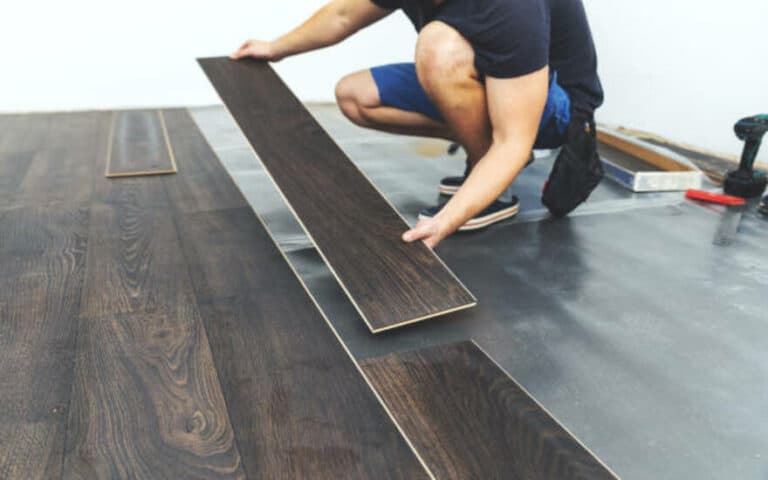In this blog post, I’ll explore the ABC of natural stone bathroom flooring – from types and quality to maintenance and care. Read on to find out everything you need to know!
Types of natural stone commonly used for bathroom flooring

As I explore the ABC of natural stone bathroom flooring, it’s important to consider the various types of natural stone that can be used. Common natural stone flooring includes slate, marble, limestone, travertine, granite, and sandstone—each of which has slightly different aesthetic properties. Tiling stone is typically marble, onyx, granite, or slate.
1. Marble and its characteristics
Marble is known for its timeless beauty and elegance and is a great choice for bathroom flooring. It’s a very hard and durable material, which makes it resistant to scratches and stains. Plus, it won’t fade or discolor with time.
Its natural veining gives it a classic look that adds character to any space. Marble is also easy to clean, so you don’t have to worry about dirt or grime accumulating on your bathroom floor. The marble price can vary depending on the type of stone you choose and where you buy it from, so be sure to shop around for the best deal.
2. Granite and its characteristics
Granite is another popular option for bathroom flooring. It is one of the hardest natural stones and is known for its durability. Granite has a variety of colors, textures, and patterns, making it easy to find one that suits your bathroom’s style. As a bonus, granite is easy to clean and maintain.
It’s also resistant to chips and scratches, so you won’t have to worry about replacing it anytime soon.
3. Limestone and its characteristics
Limestone is one of the softest natural stones and comes in various earthy tones to compliment any interior pallet easily. I love its versatility and its ability to blend with any design style. It also is optimal for wet areas, as it doesn’t affect the quality of any indoor space air.
Limestone is a great option for bathroom flooring as it is relatively softer and can be carved into various shapes and sizes, making it perfect for creating unique bathroom designs. It also offers a luxurious look that enhances the overall atmosphere of your space.
4. Slate and its characteristics
Slate is one of the most resistant materials, making it perfect for flooring in bathrooms and kitchens. Its properties enable it to be used indoors and outdoors for flooring, high-traffic areas, and outdoor applications.
The typical color of slate varies from gray to black but can also be found in shades of green and purple. When properly sealed, slate is a great option for bathrooms and kitchens because it’s water-resistant and highly durable. It’s a natural stone that adds a unique look to any room and can be used to create a modern or rustic aesthetic.
The difference between natural stone flooring and other flooring options
In contrast to other flooring options, natural stone flooring has a few distinct advantages. It is highly durable and resistant to moisture, making it ideal for bathrooms. Natural stone flooring is also aesthetically pleasing, available in various colors, and adds a touch of luxury to the home. Additionally, it adds value to the home and can help increase the resale value. With all these benefits, it’s no wonder why so many homeowners choose natural stone for their bathroom floors.
How to choose the right natural stone for your bathroom floor?
Choosing the right natural stone for your bathroom floor is a decision that requires careful thought and consideration. When selecting the perfect natural stone for your bathroom floor, it is important to consider the durability of the stone, the style and look you want to create, the quality of the stone, and your budget.
1. Consider the durability of natural stone
When choosing natural stone flooring for your bathroom, it’s important to consider the material’s durability. Natural stone is generally considered more durable than many artificial products on the market and can last for many years with minimal maintenance.
Different types of stone offer different durability levels, so do your research and choose the stone that best fits your needs.
2. Think about the style and look of your bathroom
When selecting the right natural stone for your bathroom floor, consider the overall look and feel you want to create.
Natural stone brings timeless elegance and sophistication to any space, and depending on your type, it can also add texture and character. Marble, for example, is available in a range of styles and shades, from classic white to warm beiges and greys. Granite comes in various colors, from classic black and grey to vibrant blues and greens.
Limestone is often characterized by its subtle veining, while slate has a unique texture that can add an interesting dynamic to any bathroom. Think about how the natural stone will contribute to your overall design aesthetic before making your final decision.
3. Choose a quality stone that fits your budget
When selecting natural stone flooring for your bathroom, keeping your budget in mind is important. Synthetic materials can now better mimic natural stone, but it’s important to consider the quality of the stone you choose and ensure that it fits within your budget.
Make sure to compare different natural stone prices, as some are more expensive than others. When considering the cost of a particular stone, consider its durability and how long it will last.
Natural stones can come at different prices, so research and find the perfect fit for your budget.
4. Find the right installation contractor
Once you’ve chosen the perfect natural stone for your bathroom floor, it’s time to find a reliable contractor who can install it.
You should always research the contractor in advance and ensure they have the qualifications and experience to carry out the project. Ask for proof of their credentials, read reviews and check out their previous work.
Make sure to get several quotes and compare them before making your decision. The right installation contractor will be able to give you professional advice on how to maintain your stone flooring, so don’t forget to ask about this when interviewing them.
5. Learn the basics of natural stone floor care
As a homeowner, it’s important to understand the basics of natural stone floor care. Natural stone requires regular maintenance and upkeep to keep it in good condition and looking its best. To ensure that your floor retains its beauty for years, you should clean it regularly and protect it from spills and stains.
Additionally, you should avoid using abrasive cleaning products or tools on natural stone floors, as these can damage the surface. With a little effort and knowledge, you can keep your natural stone flooring looking new!
How to evaluate the quality of natural stone flooring?
Evaluating the quality of natural stone flooring is essential before making a purchase. While many retailers use a grading system to rate the quality of materials, understanding the differences between various stones and factors such as size, surface condition, thickness, and shape can help you make an informed decision.
I recommend researching rent types of stones to learn their characteristics and how they can suit your needs. Additionally, I suggest considering the durability of natural stone and the style and look it will bring to your bathroom.
It’s also important to choose a quality stone that fits your budget and find a reliable installation contractor. Finally, learning the basics of natural stone floor care can ensure that your flooring is well-maintained for years to come.
How to care for and maintain natural stone flooring?
Once your natural stone floor is installed, it is essential to keep up with regular maintenance to keep it looking its best.
To care for and maintain your natural stone flooring, clean it regularly with a pH-neutral cleaner designed specifically for stone. Be sure to avoid cleaners containing ammonia, abrasives, bleach, or other harsh chemicals, as these can damage the stone’s surface.
Additionally, you should seal your stone periodically to provide extra protection against staining and wear. Proper care and maintenance will make your natural stone floors beautiful for years!
Summary
In conclusion, natural stone is an excellent choice for bathroom flooring due to its durability, style, and resale value. There are many types of natural stone to choose from, including marble, granite, limestone, and slate. It is important to consider the durability of the material, as well as its style and budget, when making a decision.
Additionally, it is important to find a quality installation contractor and learn the basics of natural stone floor care. By taking these steps, you can ensure that your bathroom has the perfect natural stone flooring that looks good and lasts for years.






